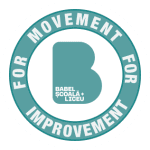We started our day with a hearty breakfast at our new accommodation in Turnhout, where we arrived last evening. We took the bus to another town, Hoogstraten, where we began our exploration of the Myrho Vocational Campus.
Within this school https://www.vti-spijker.be/ there are three major specializations: “Food and HORECA”, “Economy and Organization” and “Society and Welfare”. We had the opportunity to see every area of this school, go into classrooms and ask questions about the students’ programs. The rooms were each furnished, either in the form of dining rooms, nursing home rooms, nurseries and, above all, kitchens. Being a vocational school, here children learn trades, and at the age of 18 they can choose to leave the education system and already start a profession, although there are also some who choose to continue their studies.
In Romania, vocational schools, although they used to be extremely popular and well-equipped, have remained stuck in the past. Now, there is this negative perception of students who choose to attend such a school. It is said that these students are the underachievers, clinging to the last hope of being able to have a job later in life, but we saw something else today. We saw children who are passionate about what they do, talented and well-mannered, who even served us a whole lunch prepared by them.
Also, one of the teachers from this school prepared a presentation for us, related to food waste. This brought to our attention the main reasons why this phenomenon occurs and because of which we end up throwing away a third of all food that could be consumed: the buyer’s desire to have perfect and identical products, the inability to estimate the production in a year and the desire to make a profit, but of course, also the wrong mentality and misinformation. We found out that in Flanders each person throws away 33 kg of food every year, on average, and that in Romania 6000 tons of perfectly edible food are thrown away every day.
We talked about the forms of food waste that we see around us or actually do, but also about solutions. We gave examples of appropriate behaviors, such as buying products sparingly (using lists and always checking the pantry before going to the store), but also recipes that use common ingredients or even leftovers from other meals. Moreover, in the second part of the workshop, we divided into smaller groups and prepared several dishes (quiche, mozzarella rolls etc.), following exactly this principle. We felt good during this activity, as it was a very hands-on activity and at the end we even learned how to decorate our plates with our own dishes in the center.
At the end, we thanked all the teachers and the principal for the tour and the whole experience. In fact, this is not the only vocational school in Hoogstraten and these are not the only fields in which children can specialize. There is a second campus where students can choose trades such as: plumber, welder, mechanic and many others like that.
Next, we went to visit the Bicycle Bookstore https://fietsbieb.be/ in Hoogstraten. This is part of a much bigger project that is taking place across Belgium and whose main purpose is to encourage people, especially children, to cycle. They rent bikes for 20€/year and offer repairs for them. Growing up, a child needs an average of 6 bicycles if they are to start pedaling from an early age. It is not sustainable or sometimes even possible, from a financial point of view, for parents to buy so many bicycles for their children (the price of one is on average 250€) and this initiative offers the perfect solution.
The organization behind this project is supported all over Belgium by town halls, and the repairs are carried out by volunteers, of whom the ones we met today were all retired and with no direct experience in the repair field of bikes, but who worked with a lot of passion.
Today’s community circle took place in the courtyard of the restaurant where we ate, in the company of one of our guides today in the vocational school, but also around the town. Each of us reflected on what we saw and the moments that stayed with us. We found ourselves filled with a sense of respect for all these people who, while they might spend the rest of their lives without thinking about what else is going around them, choose to put their energy into good initiatives for their community instead. We also realized that today we got to observe many examples that, presented at home, could really lead to a change in our home city.
It was an incredible day, full of good lessons and examples that we hope will have the same effect on others as they had on us. Thank you to everyone who made this unique experience possible!
